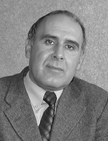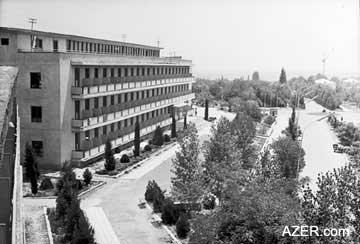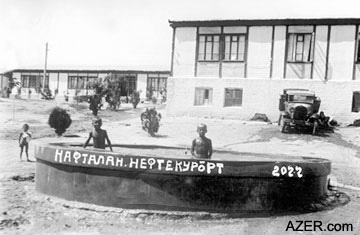|

Summer 2002 (10.2)
Pages
60-61
Naftalan - The Miracle Oil
Azerbaijan's
Therapeutic Oil
by Eldar Abbasov
  Naftalan is a rare type of oil from
Azerbaijan that is used only for medicinal purposes. Azerbaijani
doctors have prescribed it for years to successfully treat various
skin, joint and bone diseases such as psoriasis, arthritis and
rheumatism. Naftalan is a rare type of oil from
Azerbaijan that is used only for medicinal purposes. Azerbaijani
doctors have prescribed it for years to successfully treat various
skin, joint and bone diseases such as psoriasis, arthritis and
rheumatism.
The town of Naftalan, where the oil originates, has a special
treatment center that was well known throughout the entire Soviet
Union. Most of the center is now being used as a dormitory to
house refugees from the Karabakh War.
Here Eldar Abbasov, Director of Azerbaijan's Scientific Arthritis
Center, explains how physicians in Azerbaijan use Naftalan and
how the rest of the world could benefit from its therapeutic
qualities.
Another
article related to Naftalan
Naftalan
- The Oil that Heals by Dr. D. Y. Huseinov and Dr. A. I. Rustamov
(AI 3.4, Winter 1995)
_____
Naftalan is extracted from only
one place in Azerbaijan - in the north - central part of the
country, not far from Ganja. The town in question takes its name
from the oil, "Naftalan", which comes from the Azeri
for "neft alan" (oil buyer).

Above: Men bathing in Naftalan, a rare type
of healing oil found only in Azerbaijan (1958). Naftalan is used
in Azerbaijan to treat arthritis, skin diseases and various other
conditions.
  In its raw form, Naftalan oil is used
for therapeutic baths, known as balneotreatment. The 1,000-bed
Therapeutic Center in Naftalan has special treatment tubs for
this type of therapy. In its raw form, Naftalan oil is used
for therapeutic baths, known as balneotreatment. The 1,000-bed
Therapeutic Center in Naftalan has special treatment tubs for
this type of therapy.
Left: Since the Karabakh War, the majority
of rooms at the Naftalan Treatment Center have been occupied
by refugees.
In its purified form, with its "mazut" (tar or resin)
removed, Naftalan is very effective for other kinds of medical
treatment. Naftalan is different from other types of oil in that
its purified form has a high concentration of naphthene hydrocarbons,
about 55 percent. Other kinds of oil have a much lower concentration,
about three to five percent. The therapeutic oil produced in
Croatia has a 15 percent concentration. [To learn about the Naftalan
Special Hospital for Medical Rehabilitation in Ivanic Grad, Croatia,
visit www.naftalan.hr/engleska.htm.]
Products made from the purified Naftalan can be found at many
drugstores in Azerbaijan. In addition, the Naftalan is delivered
to all of the physiotherapy treatment sections of health and
treatment centers in Baku and the rest of Azerbaijan, including
our center, the Scientific Arthritis Center of Azerbaijan.
Specific Treatments
Medicine made from purified Naftalan is used for various kinds
of external and internal treatment. The type of application depends
on the specific disease and the doctor's recommendations. For
diseases like eczema and psoriasis, for instance, the Naftalan-based
medicine is rubbed on the skin.
  In the case of joint diseases, Naftalan
is rubbed on the skin before applying ultrasound; that way, the
oil can help the ultrasound penetrate more effectively. To reduce
internal inflammation, as with vaginitis or intestinal inflammation,
Naftalan is used in the form of tampons or suppositories. In the case of joint diseases, Naftalan
is rubbed on the skin before applying ultrasound; that way, the
oil can help the ultrasound penetrate more effectively. To reduce
internal inflammation, as with vaginitis or intestinal inflammation,
Naftalan is used in the form of tampons or suppositories.
Right: The Naftalan Treatment Center in north-central
Azerbaijan (1936). Patients traveled there from all over the
Soviet Union seeking medical treatment with Naftalan.
As a powerful anti-pain and anti-inflammatory agent, Naftalan
is widely used to treat back pain and arthritis. The oil reduces
edema and pain and improves joint functions. In osteoarthritis
or injuries of the spinal column, Naftalan eliminates neurological
pain.
Naftalan is not a panacea, however. It can be helpful for one
patient, but adverse for another. For burn patients, Naftalan
is not used in the initial, acute period, but it is used later
on to help speed up the regeneration process and prevent the
formation of scars.
Even though Naftalan is not carcinogenic, it is not applied to
patients who have tumors. As with other thermal procedures, Naftalan
could speed the development of a tumor.
Likewise, Naftalan is not used when an inflammation is in its
acute stage because the oil may actually speed up the inflammation
process. If the inflammation is of a systemic character, such
as when it has covered the lungs or liver, Naftalan should not
be used.
Extensive Research
Beginning in the Soviet period, Azerbaijani scientists began
studying the components of Naftalan oil to find out how its chemical
processes work. Scientific research laboratories for the study
of Naftalan were set up during the Soviet period, with branches
in Baku and Naftalan.
The scientists there studied the naphthene hydrocarbons to find
out what makes them so effective. They identified the diseases
that Naftalan can treat as well as possible side effects and
complications. However, even more research is required to study
how the mechanism found in Naftalan works at the cellular level.
Potential for the
World
If you ask any three people in the world if they have problems
with their backs, two of them will probably say "yes".
In fact, the World Health Organization (WHO) has declared the
years of 2000-2010 as the decade for the struggle against bone,
joint and muscular diseases.
These widespread diseases may not be perceived as being as serious
as heart disease or cancer because they don't result in death.
However, they have grave social and economic implications. Patients
who suffer from these debilitating diseases require drugs throughout
their entire lives. If they don't receive regular treatment,
they could become disabled. But the world's poor can hardly afford
to have access to such expensive drug therapy.
Treatments like Naftalan could be extremely valuable for the
world's medical needs. For example, we know that chronic arthritis
is widespread throughout the world. Patients who suffer from
this disease must have ongoing drug treatment. Yet in Azerbaijan,
the arthritis patients who undergo a 10-day regimen of Naftalan
treatment often find that their pain is alleviated for an entire
year, meaning that they don't have to take additional medicine.
Naftalan is a precious resource that Azerbaijan can offer to
the world, but its potential has yet to be seriously understood
or marketed. Azerbaijani experts should bring this matter to
the world's attention at congresses, seminars and other international
venues. Once others hear of the effectiveness of the Naftalan
treatment, international interest will surely grow.
Professor Eldar Abbasov is Director
of the Arthritis Center in Baku. For more about Naftalan, see
"The
Oil that Heals" in AI
3.4 (Winter 1995). SEARCH at AZER.com.
____
Back to Index
AI 10.2 (Summer 2002)
AI Home
| Magazine
Choice
| Topics
| AI Store | Contact us
Other Web sites
created by Azerbaijan International
AZgallery.org | AZERI.org | HAJIBEYOV.com
|




